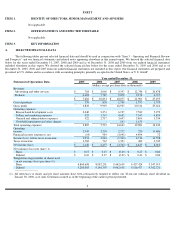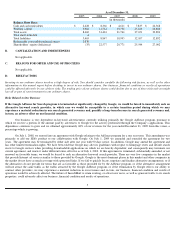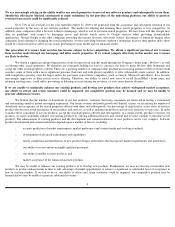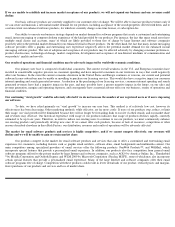Incredimail 2009 Annual Report Download - page 17
Download and view the complete annual report
Please find page 17 of the 2009 Incredimail annual report below. You can navigate through the pages in the report by either clicking on the pages listed below, or by using the keyword search tool below to find specific information within the annual report.
Our international operations involve special risks that could increase our expenses, adversely affect our operating results and require
increased time and attention of our management.
We derive and expect to continue to derive a substantial portion of our revenues from customers outside United States. Our
international sales and related operations are subject to a number of inherent risks, including risks with respect to:
Risks Related to Our In
tellectual Property
Unlawful copying of our products or other third party violations of existing legal protections or reductions in the legal protection for
intellectual property rights of software developers or use of open source software could adversely affect our revenue.
The software products that we sell incorporate a technology that reduces the ability of third parties to copy the software without having
paid for it. Unlicensed copying and use of software and intellectual property rights represents a loss of potential revenue to us, which could be
more significant in countries where laws are less protective of intellectual property rights. Continued educational and enforcement efforts may
not affect revenue positively and further deterioration in compliance with existing legal protections or reductions in the legal protection for
intellectual property rights of software developers could adversely affect our revenue.
In addition, certain of our products or services may now or in the future incorporate open source software, which are typically
distributed “as-is”
without warranties, such as warranties of performance or ownership or indemnities against intellectual property infringement
claims. Moreover, to the extent that we incorporate open source software into our products or services, (although we do not currently intend to
do so), the license for such open source software may obligate us, among other things, to pass on to our licensees without charge the rights to
use, copy, modify and redistribute the underlying software source code, both with respect to the original open source code and any modifications
to such code created by us.
●
potential loss of proprietary information due to piracy, misappropriation or laws that may be less protective of our intellectual
property rights than those of the United States;
●
costs and delays associated with translating and supporting our products in multiple languages;
●
foreign exchange rate fluctuations and economic instability, such as higher interest rates and inflation, which could make our
products more expensive in those countries;
●
costs of compliance with a variety of laws and regulations;
●
restrictive governmental actions such as trade restrictions;
●
limitations on the transfer and repatriation of funds and foreign currency exchange restrictions;
●
compliance with different consumer and data protection laws and restrictions on pricing or discounts;
●
lower levels of adoption or use of the Internet and other technologies vital to our business and the lack of appropriate
infrastructure to support widespread Internet usage;
●
lower levels of consumer spending on a per capita basis and fewer opportunities for growth in certain foreign market segments
compared to the United States;
●
lower levels of credit card usage and increased payment risk;
●
changes in domestic and international tax regulations; and
●
geopolitical events, including war and terrorism.
13
























